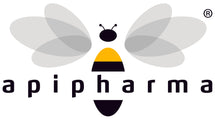In our last blog I wrote about the background, but there is so much to write about royal jelly, I delved further, thus this second blog. If you didn't read the first blog click here: https://apipharma.com/blogs/apipharma/unveiling-the-golden-elixir-exploring-the-mysteries-and-benefits-of-royal-jelly.
In the world of natural health and wellness, few substances have captured the imagination quite like royal jelly. Produced by honeybees, this milky secretion serves as the exclusive food for the queen bee, enabling her remarkable longevity and fertility. Yet, beyond its role in the hive, royal jelly has emerged as a potent elixir for human health, gaining popularity for its diverse array of benefits.
Composition: Royal jelly is a complex substance composed of water, proteins, sugars, lipids, vitamins, and minerals. Its precise composition varies depending on factors such as the bees' diet and environmental conditions. Notably, royal jelly contains essential amino acids, fatty acids, vitamins B-complex, and trace minerals, making it a nutritional powerhouse.
Key Benefits: The health benefits of royal jelly are extensive and diverse. Its claimed antioxidant properties help combat oxidative stress and inflammation, supporting overall immune function. Additionally, royal jelly is renowned for its potential to enhance skin health, promoting collagen production and reducing signs of aging Moreover, it may support cardiovascular health by helping to regulate cholesterol levels and blood pressure. This is the understanding from Europe and Asia, and slowly making its way to the US, but the views are based more on historical personal learnings, while scientific clinical trials are still in their infancy.
Origin and Production: Royal jelly is meticulously produced by worker bees, who secrete it from their hypopharyngeal glands. Initially fed to all larvae, royal jelly becomes exclusive nourishment for the queen bee, contributing to her remarkable size, fertility, and longevity. Harvesting royal jelly involves careful extraction from the queen's chambers within the hive, ensuring minimal disruption to the colony.
Rising Popularity: In recent years, the popularity of royal jelly has surged as interest in natural remedies and holistic health practices has grown. The perceived reputation as a nutrient-rich superfood and its purported benefits for skin, immune, and cardiovascular health have attracted consumers seeking alternative wellness solutions.
Conclusion: Royal jelly stands as a historical testament to the remarkable synergy between nature and human health. Its rich nutritional profile and diverse array of benefits make it a prized addition to the repertoire of natural health enthusiasts worldwide. As scientific inquiry is only beginning to penetrate the perceived benefits, loyal royal jelly consumers eagerly await validation that royal jelly provides a beneficial supplement toward a healthier life.


